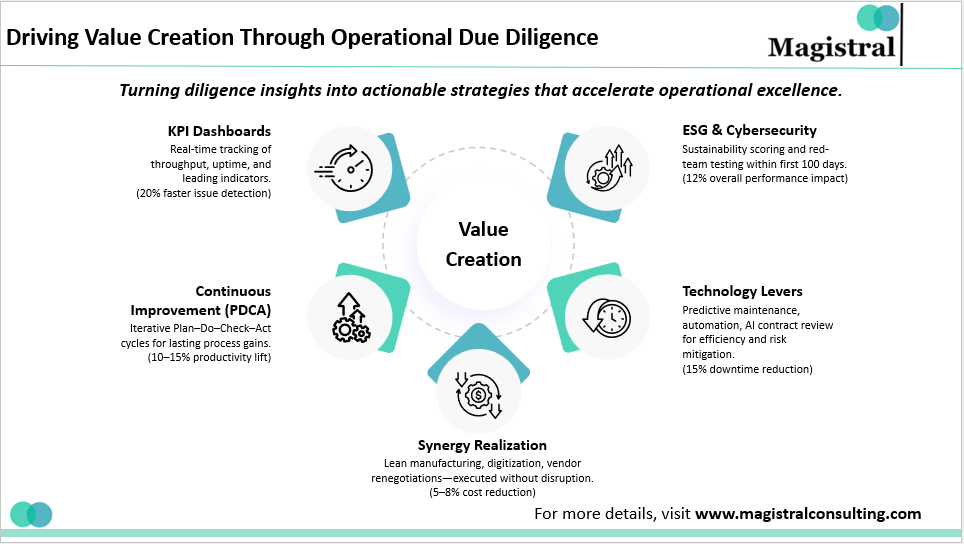In today’s complex deal landscape, operational due diligence is a must for investors. The due diligence process is critical to establishing a forward-looking assessment of processes, people, technology, and sustainability, while uncovering potential hidden liabilities and potential levers for increasing value. It ensures wireless transactions early on, allowing for smooth integrations, accelerating the capture of synergies, and sustainable performance gains.
Objectives
Operational due diligence evaluates whether a target’s operations can support the investment thesis and drive returns, assessing systems, staffing, facilities, and potential constraints. It identifies improvement opportunities, plans for growth, and mitigates hidden costs, while fostering alignment through co-creation workshops. The process informs integration plans, covenants, and earn-outs, ensuring assumptions are validated and post-close value is maximized.
Validating Operational Sustainability
Deal teams simulate stress scenarios to test whether current technology platforms and production processes can sustain forecast volumes. As a result, they quantify capex requirements and prevent costly surprises during integration.
Uncovering Critical Investment Needs
The teams identify unknown dependencies and funding requirements through deeper process mapping and working-capital modelling. These findings can help ensure pricing for the bid reflects true cash-flow dynamics, and no cash flow deficits occur post-close.
Securing Stakeholder Alignment
In workshops with senior management, they have become engaged in taking individual and collective ownership of the findings. When organizational leaders are involved in the hypothesis development and solution design process, they are also more likely to be advocates and execution champions for operational improvements and to speed up implementation.
Informing Transaction Structure
The detailed understanding of transactional and related operational risk and upside opportunities gives deal teams greater negotiating power to shape earn-outs and covenants that protect value while incentivizing performance.
Prioritizing Value Levers
Once the operational due diligence effort ranks possible initiatives in order of expected impact and complexity of implementation, there is a clear roadmap of the efficiency and growth projects, creating clarity and action to maximize expected return on diligence investment while speeding up synergy delivery.
Stages of the Operational Due Diligence Process
The ODD process is structured to ensure teams stay focused on the needs of the acquiring team and have a completed analysis within a specific timeframe.
Preparation & General Information Collection (1–2 weeks)
During this phase, teams establish objectives, curate experts, and outline a detailed work plan. They compile financial, operational, and organizational information, test their initial hypotheses via visits and interviews with management, and finalize phase 2 plans after presenting their preliminary findings to the acquiring team.
Area-Specific Analysis (1–2 weeks)
Deal teams will then commence their “deep dive” into the critical functions of supply chain, IT, HR, and operations. They will continue their collection of data, transition into completing their current state assessments and scenario modelling on their area-specific analysis and identify potential risks and improvement opportunities in these areas. The Interim Insight sessions would continue to check in with stakeholders and ensure intuition is managed and actions are grounded for subsequent stages.
Consolidation & Final Presentation (1 week)
The consolidations and synthesis of all analyses would lead the team to produce a singular report that reflects key risks, value-creating levers, and required resources. A 100-day integration journey with KPIs would be delivered, and a presentation would be provided to stakeholders to support their final decision to commit.

Stages of the Operational Due Diligence Process
Harnessing Advanced Technologies in Operational Due Diligence
Organizations are utilizing technology to help further their operational due diligence efforts in both depth and speed. For instance, AI-powered risk analytics, when applied to tens of thousands of data points, lead to the identification of risks and document review timeframes dropping from weeks to hours, if not minutes. Also, predictive maintenance algorithms extract patterns from sensor records, permitting teams to prioritize their capital investment and all while reducing unplanned downtime by an average of 50 percent. Natural-language processing tools significantly enhance risk reviews and identification of non-compliance related to complex contracts and obligations, allowing for the mapping of ESG performance on the same cost-to-benefit basis as traditional cyber security red-team exercises and data-privacy auditing.
AI-Powered Risk Analytics
Advanced AI model performance helps compress review windows by establishing relationships between risk weaknesses and anomalies across massive sets of operational data within suitable boundaries.
Predictive Maintenance Modelling
The application of machine learning algorithms to equipment sensor and maintenance records allows teams to identify and prioritize capital investments; this simple exercise reduces unplanned downtime by fifty percent as a rule of thumb!
Automated Contract Review
The use of natural-language processing tools allows a team of lawyers to ingest complex agreements into algorithms and flag non-standard clauses or compliance gaps in hours, whereas a complete contracting process could take weeks, if not months.
ESG Performance Mapping
Ensuring that traditional and cost-focused operational KPIs also include sustainability scoring or ESG helps ensure environmental and social risks are not ignored, as a sustainability commitment is assessed on a simple cost-ton basis.
Cybersecurity and Compliance Integration
Aspects of operational due diligence include performing red-team exercises, data-privacy audits, and similar due diligence exercises to evaluate the manager’s cyber resilience, including data protection obligations like GDPR or CCPA.
Operational Due diligence Compared to Other Types of Due diligence
Even while financial, commercial, tax, and legal reviews are a backward-looking examination to preserve existing value, operational due diligence is a forward-looking process to generate value. ODD has a unique, continuous, and iterative approach that relies on hypothesis-led deep dives co-developed with management, rather than standard checklists performed by independent advisors to assess past performance. This collaborative approach ensures insights are practical, targeted, and directly tied to operational realities. Consequently, ODD goes beyond identifying potential deal-breakers—it highlights precise operational improvements, efficiency opportunities, and strategic priorities that can materially enhance performance, strengthen competitive advantage, and drive superior returns post-close.
Key Highlights:
Focuses on future performance and value creation, not just past performance.
Uses hypothesis-led deep dives in partnership with management.
Goes beyond risk identification to deliver clear, actionable improvements.
Aligns operational changes with investment thesis and long-term growth goals.
Driving Value Creation Through Operational Due Diligence
Implementing diligence insights into action creates tangible performance benefits and advantages:
KPI Dashboards
Incorporate leading indicators (e.g., throughput rates, uptime) automation into real-time monitoring tools.
Continuous Improvement (PDCA)
Run Plan-Do-Check-Act iterative cycles to cement process improvements.
Synergy Realization
Performing lean manufacturing, digitization, and vendor renegotiations in a controlled way without disrupting the business.
ESG & Cybersecurity Enhancements
Execute sustainability scoring and red team exercises in Day 1 – 100 days to action plan.
Technology Levers
Automation of sequential processes, predictive-maintenance analytics, and AI contract reviews to offset efficiency and coverage risk.

Driving Value Creation Through Operational Due Diligence
About Magistral Consulting
Magistral Consulting has helped multiple funds and companies in outsourcing operations activities. It has service offerings for Private Equity, Venture Capital, Family Offices, Investment Banks, Asset Managers, Hedge Funds, Financial Consultants, Real Estate, REITs, RE funds, Corporates, and Portfolio companies. Its functional expertise is around Deal origination, Deal Execution, Due Diligence, Financial Modelling, Portfolio Management, and Equity Research
For setting up an appointment with a Magistral representative visit www.magistralconsulting.com/contact
About the Author

Nitin is a Partner and Co-Founder at Magistral Consulting. He is a Stanford Seed MBA (Marketing) and electronics engineer with 19 + years at S&P Global and Evalueserve, leading research, analytics, and inside‑sales teams. An investment‑ and financial‑research specialist, he has delivered due‑diligence, fund‑administration, and market‑entry projects for clients worldwide. He now shapes Magistral Consulting’s strategic direction, oversees global operations, and drives business‑development support.
FAQs
What is operational due diligence, and why does it matter?
When should it begin in the transaction timeline?
How much time does the process require?
Who takes part?
How are findings translated into action?